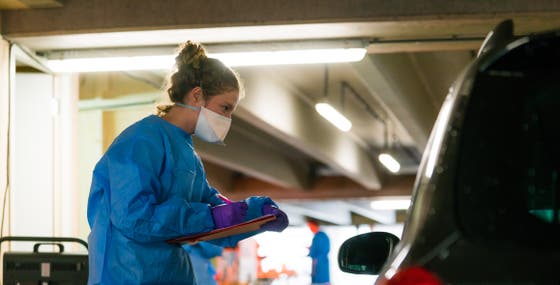Nov 21: Mass screening for corona will not allow for reopening of society

Utrecht, November 20, 2020 - Massive and repeated testing of the population for the coronavirus, followed by isolating people that can spread the virus, after the current wave is not a feasible solution for the reopening of society. This conclusion is drawn in a new modeling study by epidemiologists from UMC Utrecht and Utrecht University.
To limit the social and economic costs of the lockdown measures, a strategy is needed that controls the spread of the coronavirus and at the same time to allow to eliminate these measures. Regular mass screening of large parts of the population, regardless of whether there are corona complaints, has recently been proposed as a possible control strategy whereby society can (largely) be reopened. According to this proposal, from March 2021 onwards, each Dutch person would be able to have themselves tested once a month on average, even if they are asymptomatic. To achieve that goal, the Ministry of Health, Welfare and Sport wants to increase the capacity to 10 million tests per month. However, it is not known whether such a strategy can actually control spread of the virus.
Not a realistic strategy
Research leader Marc Bonten (UMC Utrecht) interprets the results of the modelling study as follows: “Regular mass screening, followed by isolation of infectious persons does not seem a realistic strategy to fully reopen society after the current corona wave. A more targeted screening will therefore be necessary in order to be able to use these rapid tests in a meaningful way as a supplement to other control measures. For example, we can think of mass screening in parts of the country where the infection level is high or in sub-populations where virus spread is high.”
Not feasible
Assuming a natural reproduction number (R0) of 2.5 (meaning that without measures, each infected individual will on average infect 2.5 people), this study shows that the complete elimination of control measures for tested subjects with a negative test result would require that the full population should have a rapid test more often than every three days to keep the R0 below 1. If social distancing measures are maintained (the situation in the Netherlands in August 2020), 60 percent of the population would still have to have themselves tested every week to prevent the spread of the corona virus from getting out of hand.
Mathematical model
Investigators from the Department Epidemiology of Infectious Diseases of UMC Utrecht and Utrecht University have developed a mathematical model to investigate if mass testing of the population, including people without symptoms, can stop the spread of the coronavirus. The idea behind this is that massive and regular screening can also identify and isolate asymptomatic spreaders of the virus. In developing their model, the researchers used variables such as R0, test sensitivity, test frequency, virus spread after a false negative test, virus spread by individuals who do not get tested, the effectiveness of self-isolation after a positive test and the proportion of the population that is tested. They then calculated the required test interval and coverage to keep R0 below 1 during repeated mass screening.
Publication
Bootsma MCJ, Kretzschmar ME, Rozhnova G, Heesterbeek JAP, Kluytmans JAJW, Bonten MJM. Regular universal screening for SARS-CoV-2 infection may not allow reopening of society after controlling a pandemic wave. Preprint posted on medRiv, November 18, 2020.
